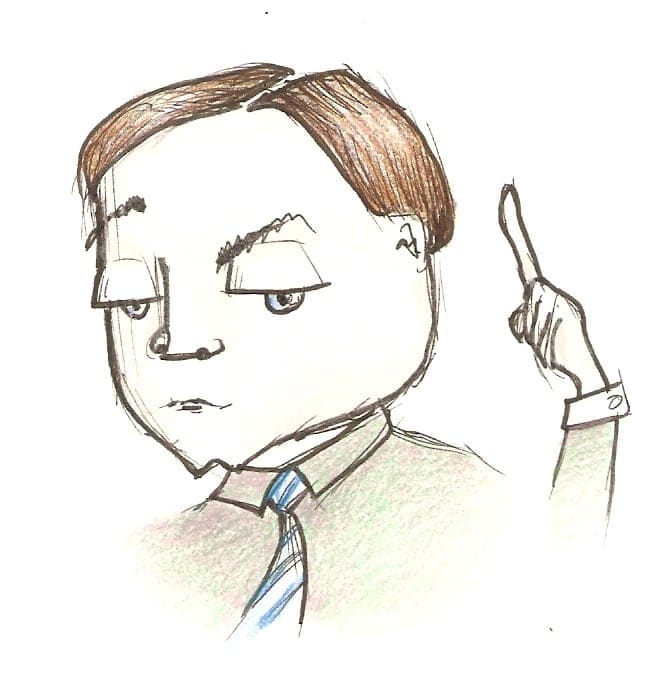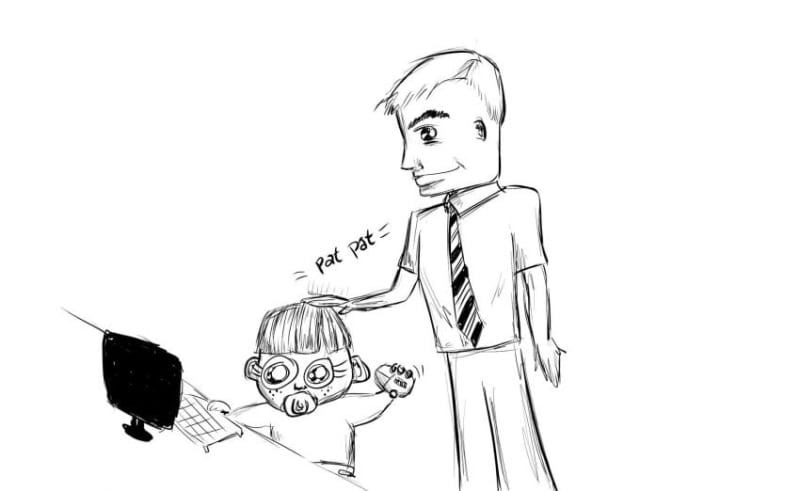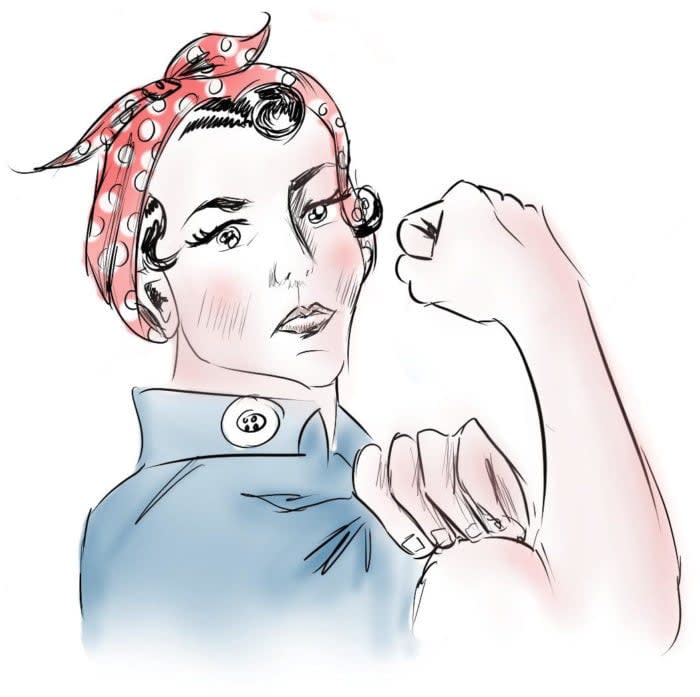I know a bunch of you already have your pitchforks out, so let me start out by establishing some goalposts for my premise. When I’m done, you may still want to skewer me, but at least it’ll be for the right reasons, if you do.
Through the rest of the post, I’m going to draw a distinction between amateurishness at craft, and amateurishness at business. Understanding my premise hinges on understanding that someone (a technician, in particular) can simultaneously be a craft professional and a business amateur.
Oh, and incidentally, I’m not overloading the definition of amateur — I’m using it in the most literal sense.
Taking part in an activity for pleasure and not as a job, or (of an activity) done for pleasure and not as a job
Someone who lacks skill in doing something
Professional Craftsperson, Amateur Business Owner
For ease of illustration, let’s imagine someone following my own career arc. This person spends years employed as a technician. In my case, a software engineer.
This person, in their salaried capacity, becomes a professional, non-amateur, generalist software engineer. Specifically, they become professional at maintaining a generalized, diverse skillset that allows another party (the employer) to deploy them in a wide variety of ad hoc situations.
The professional software engineer becomes agnostic about things like tech stacks, implementation particulars, and, crucially, business outcomes. They hyper-optimize for versatility and feature shipping efficiency, abdicating on any true study of the business, beyond off-the-cuff opinions (“this feature is stupid, no one will buy this.”)
Now let’s assume this software engineer decides to hang out a shingle as a freelancer. Almost without exception, this launches them into a pupal state between employee and business owner. They become amateur business owners.
You can recognize this by the continued focus on matters of technician craft and navel gazing about how they work, rather than for whom or why. They continue to abdicate on business outcomes for their clients, even though delivering client/customer outcomes is the absolute backbone of business professionalism.
So this formerly professional craftsperson becomes an amateur business owner. And the billable hour is, quite literally, the currency of amateur business ownership.
Every hour they bill is thus an amateur hour.
What’s Wrong with Amateur Billable Hours? The Easy, Self-Interested Version
At this point, you might find yourself thinking, “alright, so some internet blowhard thinks I’m an ‘amateur.’ Who cares?”
The answer is “you should, dear reader-freelancer.”
The most succinct way that I can think to summarize the problem is to say that the billable amateur-hour puts both a low ceiling and heavy downward pressure on your earning potential. I’ll walk through why I say that, in detail.
The Downward Pressure: Your Hours Are a Commodity
First, let’s look at the idea of downward pressure on your income. This happens because billable hours for “.NET programmer” or whatever are a commodity. Here, I’m using a more specific definition that you’ll find under 3:
A good or service whose wide availability typically leads to smaller profit margins and diminishes the importance of factors (such as brand name) other than price
In brutalist terms, there are a ton of .NET developers out there, so why should I pay you $95 when some other .NET developer on Upwork will do it for $85? Oh, wait, to hell with that guy, I just found someone on Fiverr for $45 — what a deal!
Of course, you could argue that you’re “better,” but that really just means “cheaper in the long run.”
The point is that you and 5 million other, similar technicians are all competing to be the cheapest, so the downward pressure on your particular work is just the stuff of Econ 101.
The Cap: “The Market” Determines Your Pay Band
Now, I’m not saying the “quality” positioning won’t work on some folks. Higher price tends to convey higher quality and better experience on its face. And if some prospect recently set a bunch of money on fire with the Fiverr guy, they’ll be primed to pay a relatively premium rate.
But relatively premium only goes so far.
I just googled “freelance programmer hourly rate range” and landed on this article as the top entry, at the time of writing. Now, imagine that I’m a buyer tasked with hiring a freelance programmer, and I run across this in the article:
The cost of hiring freelance developers varies significantly from one country to the other. The range of hiring freelancers in North America goes from $50 to $250.
There is no planet on which I will pay you more than $250 per hour, no matter how “good” you claim to be. There is an acceptable range for the market value of your work, and you are simply not in that range. Hiring you would thus make the buyer a rube, so they move on from you and may or may not bother to respond to your proposal with a “come on, get serious.”
What’s Wrong with Amateur Billable Hours? The (Professional) Business Owner Version
Up to this point, I’ve succeeded in presenting you with the lede: you will be forever slogging against commodification and endless competition. And I’d expect forever-slog to be more compelling in your mind than me calling your hours amateur hours.
But let’s now dive into some business theory, under the assumption that becoming a professional (outcome-focused) business owner interests you, at least in the abstract. The problem with billable hours cuts far more deeply into your clients than into you. Commodified or not, making computers go beep-boop for $125 an hour isn’t a bad life.
Billable Amateur Hours Suck for Client Experience
Let’s start with the easiest one. Being a customer of hourly billing is one of the worst life experiences imaginable.
Don’t believe me? Call a law firm and ask for advice about something you’re doing. (More about lawyers and amateurishness, later)
Write a little script that multiplies the seconds by $450 per hour so that you can watch money leak out of your pocket with each passing second. Is that a fun feeling? Is it any wonder the world has an entire lore of humor dedicated to hating lawyers?
It’s not the divorces or the argumentativeness or the eat-the-rich sitting at the core of that hatred. It’s the billable hour. And it’s the fact that our collective interaction with lawyers is them poking a hole in your pocket and bleeding out money uncontrollably until you’re broke.
When clients don’t mind paying by the hour, it’s generally because your work fits into a budget and they view you as a pseudo-employee. It’s entirely appropriate to pay employees by the hour, since they aren’t responsible for business outcomes, and the company’s arrangement with them is “do miscellaneous tasks indefinitely and I’ll pay you indefinitely.”
The only way your billable hours don’t suck for them is when you recreate this same arrangement as a freelancer.
Billable Amateur Hours Foist All Risk onto Clients
When companies hire employees, they assume outsize risk in return for economies of scale. If a freelancer charges $50 per hour you can likely hire someone with a similar skillset as an FTE for around $50K per year, give or take (which corresponds to gross pay around $24 per hour).
This is because hiring employees is messy and risky.
There are the HR risks, but also the risk of not deploying that employee in a valuable way, indefinitely. All of that risk reduces the market value of the arrangement to employers. But that’s fine for employees, because that’s the nature of salaried employment, as agreed by all parties.
Technicians in the org chart explicitly agree to an arrangement wherein “what business problem does this solve” is above their paygrade.
Flip to freelancer with an hourly rate, and you’re continuing to assume no responsibility for the outcome, just at a much higher rate. When you bill by the hour, what you’re really saying is “I have no idea if what I’m doing will have any value, and I honestly don’t care — all that matters is that I am not exposed to risk for even a single minute of my time working for you. I get paid for every minute.”
And believe it or not, I’m not criticizing that outlook, per se. I’m just pointing out that it’s not exactly the stuff that million dollar consulting is made of.
You’re making your clients assume all risk and responsibility in dealing with you. And that’s, well, amateurish.
Imagine if you went to Starbucks and ordered a cup of coffee and the barista said “that’ll be $30 per hour, I’ll get started.” Wouldn’t you wonder why they couldn’t just give you a flat price, if nothing else, based on their knowledge of the cost of ingredients and average time to make a cup of coffee? Wouldn’t you maybe think to yourself, “why don’t you know the cost and time — have you never made coffee before?”
Billable Amateur Hours Stop You from Bothering to Deliver Outcomes
And this gets to the crux of how you can stop operating as an amateur business owner. You need to gain so much experience in delivering an outcome that you can flat price it and operate at a profit. And you can’t do this by flailing around random, unrelated projects doing miscellaneous technician labor.
You need to assume some responsibility and risk for some kind of business outcome and then become an expert in delivering it.
I have started to view the business I own, Hit Subscribe, as a productized service incubator. And you don’t sell productized services by the hour.
I bring this up because I have imposed the creative constraint on bringing services to market that we won’t bill time and materials for things. In the alpha run stage, this sometimes means we guess and then overcharge or undercharge, with the latter way more common. In other words, I’m assuming the risk as we bring these things to market.
And do you want a life hack for figuring out your cost structure and how to deliver an outcome super-fast? You pay for it yourself when you get it wrong. You’ll be amazed how fast you learn.
Coming into a market with flat prices has a lot of other benefits as well:
- You can under-sell hourly competitors while making more profit than them.
- Your sales process will feel like you have a cheat code it’s so easy.
- Your positioning naturally falls into place without fluff about “quality,” since you’re delivering an outcome.
- Your marketing benefits from your status as an expert in the outcome, rather than a risk-averse pseudo-employee.
I could go on, and all of those things do matter. But in the end, the creative constraint itself probably adds the most value for you. Once you stop with the billable hour, you stop operating as an amateur and learn how to own a business.
What about Lawyers? Are They Not Professionals?
I’d be remiss not to address what I imagine people would raise as an objection. Specifically, that my framework here casts every lawyer out there as an amateur.
Am I really saying all lawyers are amateurs?
Well, yes and no.
Yes in the sense that a rigid application of my thinking framework here will do that. But no because I don’t think amateurishness is the reason for the billable hour being so sticky in the legal world.
I think lawyers bill their client by the hour not because they think it’s better, or even reasonable, but because, in the immortal words of Will Hunting, “f$*& him, that’s why.”
Without alleging any conscious conspiracy, it’s fair to say that the legal industry, with its Bar Association, acts as something of a high-end service cartel. The Bar regulates all manner of things with lawyers, and it also produces the very people who lobby for laws, create them, and adjudicate them. And all of those lawyers go about creating and upholding laws that force you to hire lawyers.
Why would lawyers bother to do anything other than spray their risk at you like a firehose? It’s not like hiring one is a choice you have in most cirumstances. The legal cartel is like the DMV or the IRS — lacking in any real incentive to create a good user experience.
Amateur to Professional
So set aside any counterexamples where the service provider has no incentive to care about you, the service consumer. This leaves the fundamental question of whether you want to assume risk and bet on yourself to have any business ownership upside.
You can skip this and have a career-long run of hourly freelancing if that suits you. You’ll need to constantly elude the gravitational pull of commodification and square yourself that your career is basically just salaried employment with less paperwork and slightly more employers. In exchange you’ll have more freedom and variety of work than salaried, but not by much (at least, not from my perspective as an equity business owner).
If, on the other hand, you view freelancing as a path to real business ownership, your first step is to recognize that the billable hour is a binkie that keeps you in amateur purgatory for the entire time you rely on it. A kind of Hotel California with timesheets.
And that’s really my only call to action — the recognition as the first step.
I’m not suggesting you fire all of your hourly clients or do anything dramatic. I’m not even suggesting any immediate change. Rather, I’m just suggesting that you change your viewpoint.
If you want to be a professional business owner, you need to become an expert in delivering outcomes that add value. And you’ll never achieve that without enough reps to flat price your work and enough skin in the game to feel it when you get it wrong.
The post Every Billable Hour is Amateur Hour appeared first on DaedTech.



























